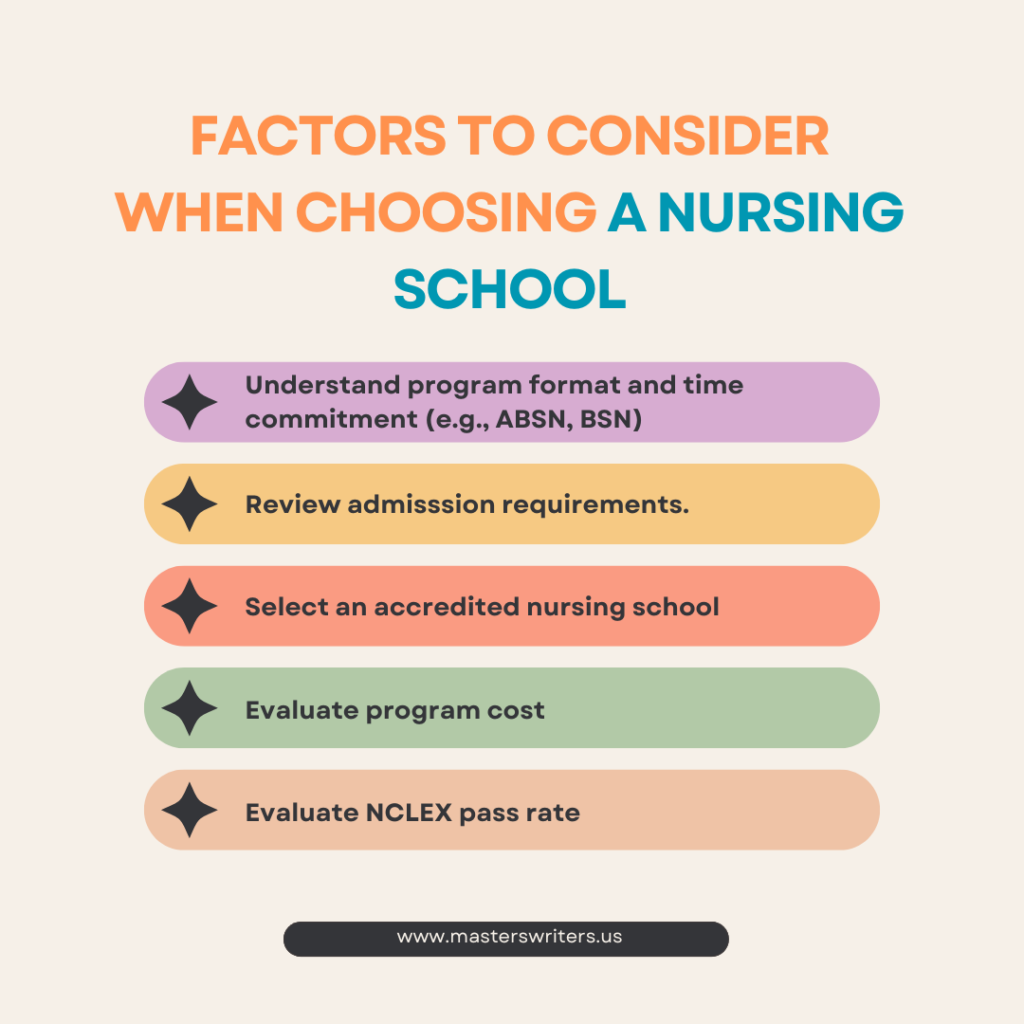Nursing
How Long Is Nursing School - Degree Breakdown


Nursing stands out as one of the most trusted and vital professions in the healthcare sector, with nearly 4.7 million registered nurses (RNs) serving across the United States, according to the National Council of State Boards of Nursing. An impressive 89% of these RNs are actively practicing, highlighting the demand and opportunities in the field. The outlook is promising for those aspiring to join this rewarding career, offering stability and competitive salaries.
If you’re considering a career in nursing, the journey is both challenging and fulfilling. This article explores the key questions future nurses often ask: How long is nursing? What should you expect from the educational process? And what are the steps to successfully embark on this career path? Let’s find out the answers below, and remember, you can also reach out to us with your “do my essay online” request!
What to Expect from a Nursing Degree
Earning a nursing degree opens the door to a rewarding and versatile career dedicated to caring for others. Registered nurses (RNs) make up a significant portion of the U.S. workforce and benefit from competitive salaries, with the Bureau of Labor Statistics reporting an average annual income of $77,600.
Throughout the nursing program, students develop critical skills such as clinical judgment and problem-solving, which are vital for their future roles in healthcare. They gain knowledge in medical terminology, learn how to operate various medical equipment, and often participate in clinical rotations, providing hands-on experience in real healthcare environments. If you need extra support with your studies, consider looking into options to buy nursing paper to help you along the way.
After completing their degree, RNs have many career opportunities to explore. Many choose to work in hospitals specializing in emergency care, pediatrics, or neonatal intensive care. Others find fulfilling roles in nursing homes, outpatient clinics, or urgent care centers. Additionally, some RNs pursue positions within government agencies, including city health departments or national organizations like the Centers for Disease Control and Prevention (CDC).

Feeling Driven but Stuck on Writing?
Stay motivated as we handle your writing tasks, ensuring you receive top-notch nursing papers written by experts!
How to Get into Nursing School
A career in nursing is a wise choice, especially considering the growing demand for healthcare professionals. The federal government projects that more than 203,000 new registered nurse positions will be created annually from 2021 to 2031, making nursing a stable and promising career path. You’ll need to follow several key steps to enter nursing school successfully.
First, it’s essential to decide on your nursing career path. The field of nursing offers a variety of roles, from entry-level positions to advanced practice and leadership roles, each requiring different levels of education and specialization. Your choice will determine the type of nursing program that aligns with your career goals.
Once you’ve identified your career direction, the next step is choosing the right nursing degree program. Nursing roles require different educational credentials, ranging from certificates to advanced degrees. For example, a Certified Nursing Assistant (CNA) program might be ideal if you aim to enter the workforce quickly. On the other hand, if you’re aiming for an advanced practice role, such as a Nurse Practitioner, a Master of Science in Nursing (MSN) would be necessary.
Conducting thorough research is crucial before applying to nursing schools to find the program that best suits your needs. Consider factors like accreditation, available degree programs, specialization options, clinical rotation experiences, the quality of facilities and equipment, pass rates for licensure exams, career support services, and overall affordability. This research will ensure that you select a program that meets your educational needs and supports your long-term career ambitions.
Nursing School Requirements
Nursing programs have specific prerequisites designed to ensure that students are adequately prepared for the rigorous demands of the profession. These prerequisites generally apply to associate and bachelor’s degree programs, covering the foundational coursework needed to succeed on the NCLEX licensing exam.
In addition to completing prerequisite courses, nursing schools have other admission criteria that applicants must meet. Most programs require students to earn a C grade or higher in key general education and science courses. The GPA requirements can vary, with Associate Degree in Nursing (ADN) programs typically accepting applicants with a high school GPA between 2.5 and 2.75. Bachelor of Science in Nursing (BSN) programs often require a minimum GPA of 3.0.
Applicants are also commonly required to submit a personal essay. This essay is an opportunity to articulate your educational and career goals, explain your interest in nursing, and highlight any relevant experiences that make you a strong candidate.
While not all nursing schools require standardized test scores, having strong SAT or ACT results can bolster your application. Additionally, some programs may require entrance exams, such as the National League for Nursing Pre-Admission Exam (NLN PAX) or the Nursing Entrance Test (NET). It’s essential to check the specific requirements of each nursing school you are considering to ensure you meet all necessary criteria.
Factors to Consider When Choosing a Nursing School

Program Format: Evaluate the structure and duration of the nursing program to determine if it aligns with your personal and professional goals. Whether you’re interested in an Accelerated Bachelor of Science in Nursing (ABSN) or a traditional Bachelor of Science in Nursing (BSN) program, understanding the time commitment and course delivery method is crucial.
Admission Criteria: Carefully review each nursing school’s eligibility requirements and prerequisites to ensure you meet the qualifications. This includes checking GPA requirements, necessary coursework, and any additional materials needed for the application process.
Accreditation: Ensure a recognized accrediting body accredits the nursing school. Accreditation is vital for program quality, eligibility for financial aid, and meeting the requirements for licensure after graduation.
Cost and Financial Aid: Consider the total cost of the program, including tuition, fees, and any additional expenses. It’s also vital to explore financial aid options, scholarships, and the potential return on investment, especially when comparing shorter programs that may allow you to enter the workforce sooner.
NCLEX Preparation: Research the school’s NCLEX pass rates, as this strongly indicates how well the program prepares its students for the nursing licensure exam. High pass rates can signify a robust curriculum and effective teaching methods.
Clinical Experience: Look into the clinical opportunities provided by the nursing school, including partnerships with hospitals and healthcare facilities. Access to quality clinical rotations is essential for gaining practical, hands-on experience and can significantly impact your readiness for a nursing career.
How Long Is Nursing School
The time it takes to become a registered nurse can vary depending on your degree path, generally two to four years. Each educational route offers different opportunities and benefits, whether you’re looking for a faster entry into the field or aiming for a more advanced role with broader career prospects. Let’s explore the various options available.
LPN/LVN Program: A Licensed Practical Nurse (LPN) or Licensed Vocational Nurse (LVN) program is one of the quickest ways to start a nursing career. These programs typically last about one year and provide essential nursing knowledge and skills, such as primary patient care, medication administration, and health monitoring. Graduates can work under the supervision of registered nurses (RNs) and physicians, gaining valuable experience in the healthcare field. This route is ideal for those seeking a fast entry into nursing while exploring whether this career is the right fit.
Diploma in Nursing: Nursing diplomas, once a common pathway, are now less prevalent, with only a small percentage of RNs holding them. These hospital-based programs usually take 2 to 3 years to complete and combine classroom learning with extensive clinical practice. Graduates are prepared to take the NCLEX-RN exam and begin working as registered nurses. Although less common today, diploma programs still offer a solid foundation in nursing, particularly for those interested in hands-on learning in a hospital environment.
Associate Degree in Nursing (ADN): An Associate Degree in Nursing (ADN) is a popular option for those seeking to become registered nurses quickly, typically requiring about two years of study. ADN programs focus on essential nursing skills and patient care, preparing graduates to pass the NCLEX-RN exam and start working as RNs in various healthcare settings, such as hospitals, clinics, and long-term care facilities. Many nurses who begin with an ADN later pursue a Bachelor of Science in Nursing (BSN) through bridge programs to expand their career opportunities.
Bachelor of Science in Nursing (BSN) The Bachelor of Science in Nursing (BSN) is registered nurses’ most common and widely recognized degree. Typically taking four years to complete, BSN programs offer a comprehensive education that includes clinical practice and theoretical knowledge. Graduates are equipped with critical thinking, leadership, and research skills, preparing them for various nursing roles and leadership positions within healthcare organizations. A BSN also opens the door to advanced nursing degrees and specialized roles.
Master of Science in Nursing (MSN) For those looking to advance their nursing career, a Master of Science in Nursing (MSN) is the next step. This degree typically takes two years of full-time study but can vary depending on the program. MSN programs offer specialized education in areas such as nurse practitioner, nurse educator, or nurse administrator roles. Graduates are prepared for advanced practice, leadership positions, and specialized fields within nursing, significantly expanding their career opportunities.
Doctor of Nursing Practice (DNP) The Doctor of Nursing Practice (DNP) is the highest degree available in nursing practice, often requiring 3 to 4 years to complete. This terminal degree prepares nurses for the most advanced clinical and leadership roles, such as nurse executives, healthcare consultants, or academic faculty members. Starting in 2025, the DNP will be required for newly certified registered nurse anesthetists. DNP programs focus on applying research to improve patient outcomes and lead healthcare innovations.
Each nursing pathway offers unique benefits and requires a different time commitment. Your choice will depend on your career goals, how quickly you want to enter the workforce, and the level of education you wish to attain.
To Sum Up
The time it takes to complete nursing school varies depending on your degree path, ranging from 1 year for an LPN/LVN program to 4 years for a BSN, with additional time required for advanced degrees like an MSN or DNP. Understanding how long is nursing school is crucial in planning your nursing career, as each educational route offers different opportunities and time commitments. Whether you’re aiming for a quick entry into the field or pursuing advanced roles, there’s a nursing path that fits your goals and aspirations.

Eager to Chase Your Nursing Dreams?
Keep your momentum going as we handle your writing tasks!
FAQs
How long does it take to become a nurse?
The time it takes to become a nurse varies depending on your chosen educational path. An LPN/LVN program typically takes about 1 year, an Associate Degree in Nursing (ADN) takes around 2 years, and a Bachelor of Science in Nursing (BSN) takes approximately 4 years. If you pursue advanced degrees, such as a Master of Science in Nursing (MSN) or Doctor of Nursing Practice (DNP), it can take an additional 2 to 4 years.
How long is nursing school?
Nursing school duration depends on the degree program. LPN/LVN programs are typically 1 year long, ADN programs take about 2 years, and BSN programs generally require 4 years of study. Advanced degrees like an MSN can take 2 years or more, while a DNP program can take 3 to 4 years.
How many years is nursing?
The number of years required for nursing education ranges from 1 year for an LPN/LVN to 4 years for a BSN. If you pursue further education, such as an MSN or DNP, the total time can extend to 6 to 8 years or more, depending on the program and whether you study full-time or part-time.
What jobs can you get with a nursing degree?
With a nursing degree, you can pursue a wide range of careers, including Registered Nurse (RN), Nurse Practitioner (NP), Clinical Nurse Specialist (CNS), Nurse Educator, Nurse Administrator, and Public Health Nurse. Nursing degrees also open doors to specialized roles in areas such as pediatrics, critical care, oncology, and mental health, as well as leadership positions in healthcare organizations.
Sources
National Council of State Boards of Nursing. (2024). Active RN Licenses. https://www.ncsbn.org/nursing-regulation/national-nursing-database/licensure-statistics/active-rn-licenses.page
U.S. Bureau of Labor Statistics. (2022). Occupational Outlook Handbook: Registered Nurses. https://www.bls.gov/ooh/healthcare/registered-nurses.htm

